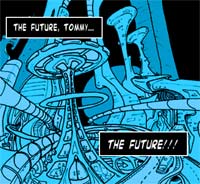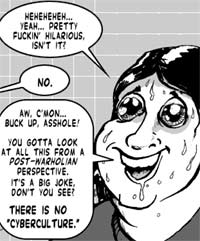
work
> CULTURAL STUDIES
:
Fast forward to 1994, life is far from what Peter had envisioned and while in a chance encounter with H.M. Ludens, editor of Future Shock magazine (which had been like a bible to him), the bomb is dropped on him the there is no cyberculture. It was an idea been perpetrated by these publications and fed to the powers who be who in turn would refer back to the so-called cyberpress for guidance and instructions. A counter-culture seizing control of the future agenda.The people who Peter had thought would be his like minded friends instead turned out to be a bunch of rich snobs comparing expensive toys. Also the notion of a chrome styled roboworld was replaced by the information revolution, most notably by the instant publishing power and communication source of the web through which the author continues to make a living to this day. The reason I chose this story as the beginning of my presentation is because it summed up for me how future utopian society relying on high technology has been predicted science fiction writers and how it differs from what actually materialised.
And whilst the future did not immediatly appear quite as they envisioned it is clear that many aspects of life today have been moulded and shaped by the science fiction writers who inspired todays scientists and engineers. < PREV - NEXT > |

